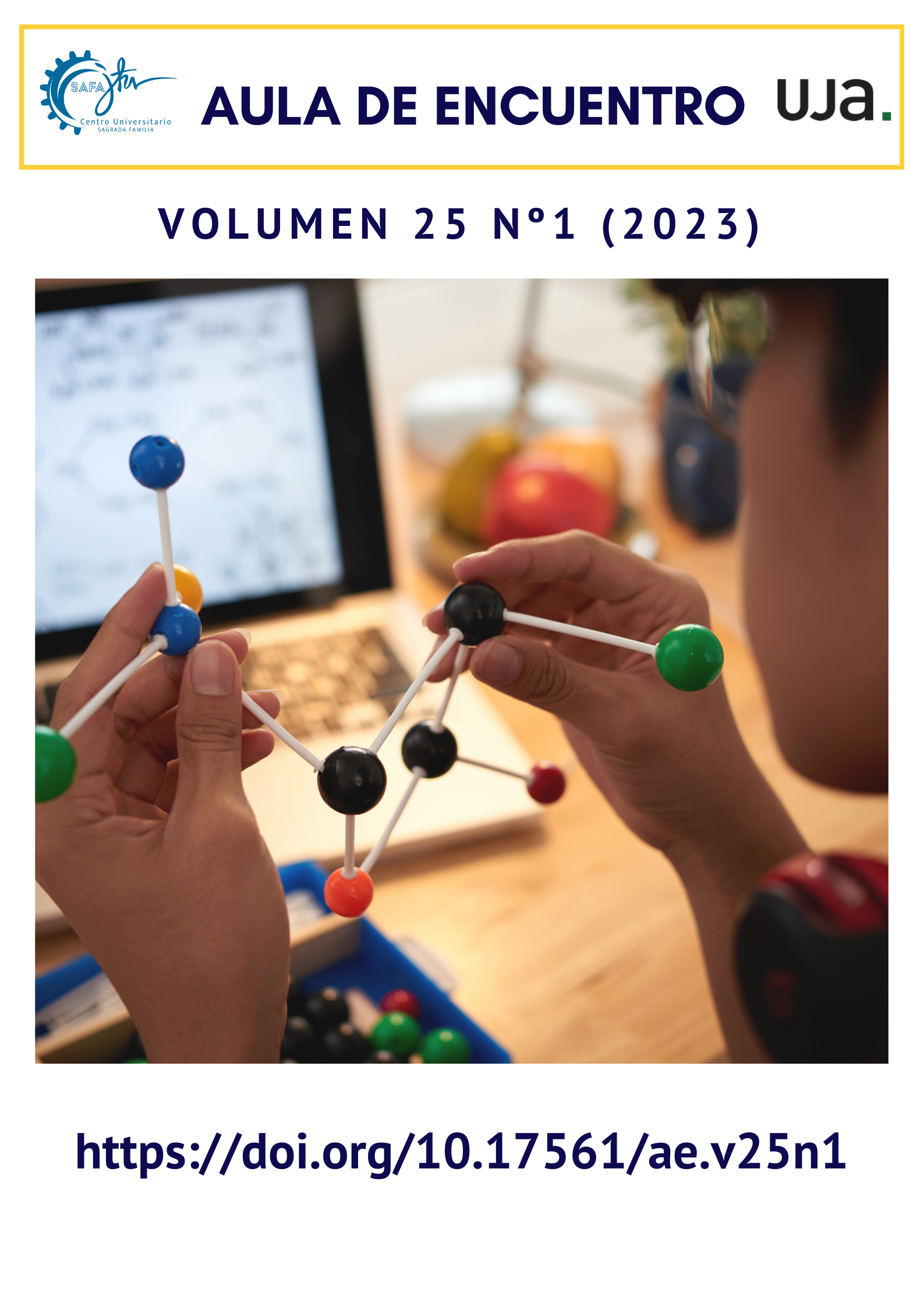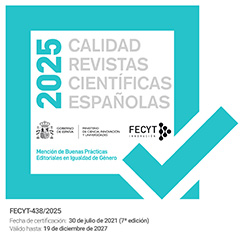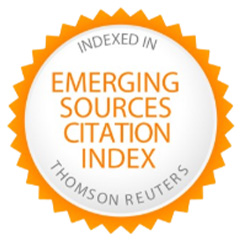Analysis of the didactic thinking of Higher education teachers on teaching methodologies
DOI:
https://doi.org/10.17561/ae.v25n1.7683Keywords:
Perspectiva didáctica, docencia universitaria, métodos de enseñanzaAbstract
This article stems from the first phase of a doctoral research aimed at analyzing the practices of teachers at the Universidad Nacional Autónoma de Honduras. The objective was to study the didactic thinking of teachers regarding teaching methodology, with emphasis on the criteria for its selection and the most frequently used methods. For this phase, we interviewed 7 novice and 5 experienced teachers who were intentionally sampled using a multiple-case strategy. The results indicate that virtual teaching as a support for face-to-face teaching, as well as the promotion of reflection, analysis, and critical thinking, are the most valued criteria by the teachers. It was also found that the most employed methodologies are group work and project-based learning, followed by the lecture.
Downloads
References
Beltrán-Ruiz, L.; Mandujano Mandujano, S.; Reyes, J.; Espinosa-Bautista, J. (2018). Uso del Software MAXQDA en el Análisis de Datos Cualitativos Multimodales en Psicología Clínica. Congreso Internacional de Investigación e Innovación. https://www.researchgate.net/publication/348372504_Uso_del_software_MAXQDA_en_el_analisis_de_datos_cualitativos_multimodales_en_Psicologia_Clinica
Brinkmann, S. (2022a). Qualitative Interviewing: Conversational Knowledge through Research Interviews. Oxford University Press, 2a ed.
Brinkmann, S. (2022b). Tænk - Til Forsvar for et Tankefuldt Liv. Gyldendal.
Brinkmann, S. (2022c). Thinking and the Moral Landscape. Culture & Psychology, 28(2). https://doi.org/10.1177/1354067X221097125
Castro-Martín, B. y Silva-Lorente, I. (2022). Aprendizaje Basado en Problemas (ABP) e Interdisciplinariedad como Ejes para el Desarrollo Profesional. Aula de Encuentro, 24(1), Investigaciones, 77-101. https://doi.org/10.17561/ae.v24n1.6773
Denzin, N. & Lincoln, Y. (2017). The Sage Handbook of Qualitative Research. Sage Publications Inc., 5ta ed.
Echegoyen Sanz, Y. y Martín Ezpeleta, A. (2020). Educación Transdisciplinar para la Sostenibilidad. Análisis Cualitativo de Actividades Didácticas. Aula de Encuentro, 22(2), 148-180. https://doi.org/10.17561/ae.v22n2.5701
Escudero, T. (2016). La Investigación Evaluativa en el Siglo XXI: Un Instrumento para el Desarrollo Educativo y Social Cada Vez Más Relevante. Revista Electrónica de Investigación y Evaluación Educativa, 22(1), 1-21. http://www.redalyc.org/pdf/916/91649056015.pdf
Fernández Navas, M. y Alcaraz Salarirche, N. (2022). Recuperando o Sentido das Atividades: Reflexões Sobre a Importância do Desenho Didático. Roteiro, 47(e30242). https://doi.org/10.18593/r.v47.30242
Flick, U. (2018). Managing Quality in Qualitative Research. Sage Publications Inc., 2da ed.
Gamboa Alba, S. (2019). Concepciones Docentes de las TIC y su Integración en la Práctica Pedagógica: Estudio de Caso en la Enseñanza de Derecho. Revista Iberoamericana de Tecnología en Educación y Educación en Tecnología, 24, 56-66. http://doi.org/10.24215/18509959.24.e07
Gimeno Sacristán, J. (2012). ¿Qué Significa el Currículum? En Gimeno Sacristán, J.; Feito, R.; Perrenoud, P. y Linuesa, M. Diseño, Desarrollo e Innovación del Currículum. Ediciones Morata, 2a ed.
Gimeno Sacristán, J. (2022). Poderes Inestables en Educación. Ediciones Morata, 3a ed.
Hernández, O. (2020). Aproximación a los Distintos Tipos de Muestreo No Probabilístico que Existen. Revista Cubana de Medicina General Integral, 37(3) e1442. http://scielo.sld.cu/pdf/mgi/v37n3/1561-3038-mgi-37-03-e1442.pdf
LaMarre, A. y Chamberlain, K. (2022). Innovating Qualitative Research Methods: Proposals and Possibilities. Methods in Psychology, 6. https://doi.org/10.1016/j.metip.2021.100083
Lune, H. y Berg, B. (2016). Qualitative Research Methods for the Social Sciences. Pearson, 9a ed.
Navarro Moreno, A. y Sanahuja Ribés, A. (2022). Aprendizaje Cooperativo en Tiempos de Pandemia. Implementación de la Técnica Compleja “Grupos de Investigación” a través de un Proceso de Investigación-Acción. Aula de Encuentro, 24(1), 102-123. https://doi.org/10.17561/ae.v24n1.6462
Nuñez Méndez, Maribel; Marcelo García, Carlos; Murillo Estepa, Paulino. (2021). Teaching Methodologies for Beginning University Teachers. Conceptions and Factors of Use. REDU. Revista de Docencia Universitaria, 19(2), 169-186.https://doi.org/10.4995/redu.2021.15622
Nuñez, M.; Marcelo, C.; Murillo, P. (2021). Teaching Methodologies for Beginning University Teachers. Concepcions and Factors of Use. REDU. Revista de Docencia Universitaria, 19(2), 169-186. https://doi.org/10.4995/redu.2021.15622
Ravanal, E.; Oyarzún, P.; López-Cortés, F. y Cabello, V. (2020). Experiencia de Reflexión con un Profesor de Biología Chileno Acerca de su Práctica de Enseñanza. Revista Didáctica de las Ciencias Experimentales y Sociales, 39, 149-160. http://doi.org/10.7203/DCES.39.17780
Ravanal, E.; Cabello, V.; López-Cortés, F. y Amórtegui, E. (2021). The Reflective Practice as a Tool for Making Tacit Knowledge Explicit. Reflective Practice, 2(4), 515-530. https://doi.org/10.1080/14623943.2021.1930527
Real Martínez, S.; Ramírez Fernández, S.; Bermúdez Martínez, M.; Pino Rodríguez, A.M. (2020). Las Metodologías Empleadas en la Innovación Educativa. Aula de Encuentro, 22(1), 57-80. https://doi.org/10.17561/ae.v22n1.3
Rivas-Rebaque, B., Gértrudix-Barrio, F., & de Cisneros de Britto, J. C. (2019). La Percepción del Docente Universitario Ante el Uso y Valor de los Datos Abiertos. Educación XX1, 22(2), 141-163. https://doi.org/10.5944/educXX1.21317
Sánchez-González, L. (2022). Principios de Procedimiento: Una Estrategia para la Calidad del Diseño Didáctico y la Evaluación de la Práctica Docente. Márgenes, Revista de Educación de la Universidad de Málaga, 3(2), 203-214. http://dx.doi.org/10.24310/mgnmar.v3i2.13932
Sola Fernández, M. [Canal Audiovisual UNIA]. (16 de noviembre de 2021). La Evaluación como Enseñanza. Webinars sobre e-learning, innovación y competencias digitales [Archivo de Vídeo]. Vimeo. https://vimeo.com/646389340
Sola Fernández, M. y Murillo Mas, J.F. (2022). Dos Décadas de Evaluación. Márgenes, Revista de Educación de la Universidad de Málaga, 3(3), 129-135. https://doi.org/10.24310/mgnmar.v3i3.15378
Yin, R. (2018). Case Study Research and Applications: Design and Methods. Sage Publications Ltd, 2a ed.
Published
Issue
Section
License
Copyright (c) 2023 Milgian Dixiana Martínez Ordóñez

This work is licensed under a Creative Commons Attribution 4.0 International License.
The authors who publish in this journal agree with the following terms:
The authors retain the copyright and guarantee the journal the right to be the first publication of the work as well as a Creative Commons Attribution License that allows others to share the work with an acknowledgment of the authorship of the work and the initial publication in this magazine.
Authors may separately establish additional agreements for the non-exclusive distribution of the version of the work published in the journal (for example, place it in an institutional repository or publish it in a book), with an acknowledgment of its initial publication in this journal.
Authors are allowed and encouraged to disseminate their work electronically (for example, in institutional repositories or on their own website) before and during the submission process, as it may result in productive exchanges, as well as a more early and major published papers (See The Effect of Open Access).















